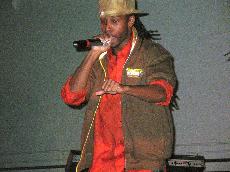Guilford hosted its first ever “Hip-Hop Now: The Series” summit, an event thought up and planned by junior Cedric Essah, on Feb. 29 and March 1.
“I was interested in creating dialogue about hip-hop between students on campus and the Greensboro community” Essah said. “I wanted people to be able to create connections through the summit, which was set up to educate, engage, cultivate and celebrate hip-hop here at Guilford.”
Visiting instructor of music Kami Rowan was the faculty advisor for the summit. It was co-sponsored by the Campus Activities Board, the Student Community Senate, WQFS, and the music and philosophy departments.
“Cedric was in my music and contemporary culture class last semester,” Rowan said. “We connected and he told me about his dream of doing this, and I wanted to support him.”
Rowan said the event allowed students to get educated about hip-hop.
“Hip-Hop is a very complex culture with many facet,” Rowan said.”While it represents a facet of Black America, African American culture is more diverse, intricate and complex than a single genre of music.”
The series began on Feb. 29 at 7 p.m. in the Bryan Jr. Auditorium with a panel discussion facilitated by Terence Muhammad, a faculty member at A&T. The panelists included Delyte, a radio DJ for 102 Jams, regional hip-hop producer 9th Wonder, Bryon Turnam, a faculty member at A&T, as well as the owners of the urban clothing stores East to West and Hints.
Essah said that he was very impressed with the quality of the panel discussion and the diversity of the participants.
“The panel consisted of an ongoing discussion beginning with the history of hip-hop,” Essah said. “Then we moved from there to talk about women in hip-hop, the fashion trends of hip-hop, and we ending with a discussion about how hip-hop can be a tool for social change.”
First-year Christina Sommerville, who assisted with planning the summit, appreciated the panel discussion because it covered these various areas of hip-hop and brought them together.
“The panel discussion dissected the true meaning and purpose of hip-hop,” Sommerville said. “With that information I was allowed to decipher the difference between true hip-hop and the less than tasteful music labeled as hip-hop today.”
First-year Grady Gamble appreciated the historical context that the panel discussion provided.
“I liked that the speakers truly knew hip-hop and were not simply bashing today’s artists,” Gamble said. “My favorite information was given by 9th Wonder when he spoke on the influence of Africa on hip-hop.”
Sommerville agreed and said that before anyone can understand the hip-hop of today, it is necessary to learn about its roots.
“Most of the younger generation feels as though learning the past is unnecessary and they forget that we have to know our past to understand our present,” Sommerville said. “Without knowing the history of hip-hop many can be ignorant to the initial purpose of hip-hop and just associate it with stereotypes of certain racial groups.”
Rowan said that the commercialization of hip-hop was a running theme in the panel.
“The consensus of the panel was a deep frustration around the commercialization of hip-hop,” Rowan said. “The panelists represented a diverse range of professionals working within some facet of hip-hop – fashion, music, dance, academia.”
According to Sommerville, unlike rap, hip-hop is not just a music genre but a unique lifestyle that encompasses music.
“It allows individuals to express themselves within a realm of reason,” Sommerville said. “Although the panelists are big in their own arenas, they were so down to earth. They were quite enjoyable and delightful to speak with. The way that (they) presented hip-hop made it seem even more made for the average man.”
The summit continued on Saturday at 7 p.m. in the Alumni Gym with a number of performances including beat boxing, a step team, and vocal and choreographed performances to showcase the “true hip-hop” discussed in the panel. The performances were followed by a poetry slam showcase featuring The Slam Poets of Charlotte, who won first place at the 2007 National Poetry Slam.
“I enjoy the various poets, they were all great,” Gamble said. “Also, the choreographed dancers were very good. But most of all, I loved the beat-boxing performance at the beginning. The artist was very talented.”
“I really enjoyed the spoken word poets,” said senior LaToya Thomas. “There was such range and they were great individually and made a dynamic group,”
Even though the poetry performance was advertised as a poetry “slam,” according to Kane Smego, a sophomore at UNC and a contributor to the poetry performance, “Spoken word poetry is what it is, since it was not a competition. It becomes slam poetry when poets compete in local, regional or national contests.”
Smego, a former member of the Durham youth slam team and a current member of the Bull City slam team, said that “Spoken word gives people an outlet to share personal experiences and talk about social and political change.”
Smego especially appreciated the diversity of the performances.
“I thought the show at Guilford was phenomenal. It encompassed everything to me, from social justice to political action. It was one of the best shows I have ever seen. It was hot!
Categories:
“Hip-Hop Now: The Series” educates campus through discussion and performances
Deena Zaru
•
March 21, 2008

(Amy Drolet)
0
More to Discover
